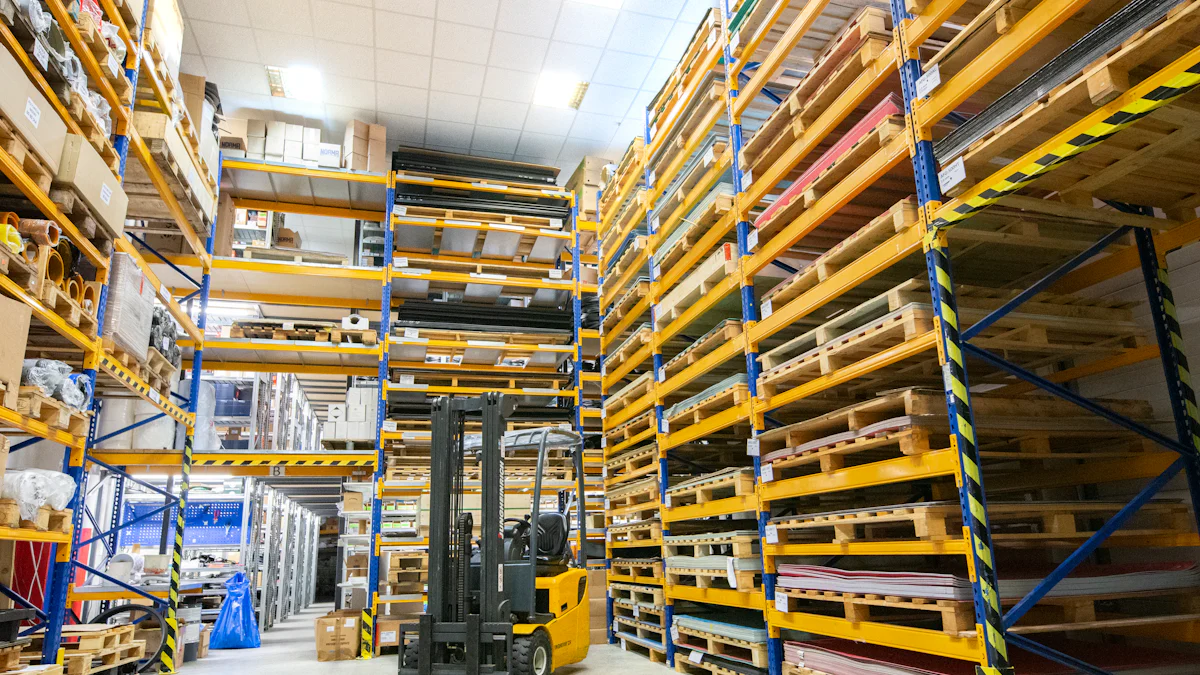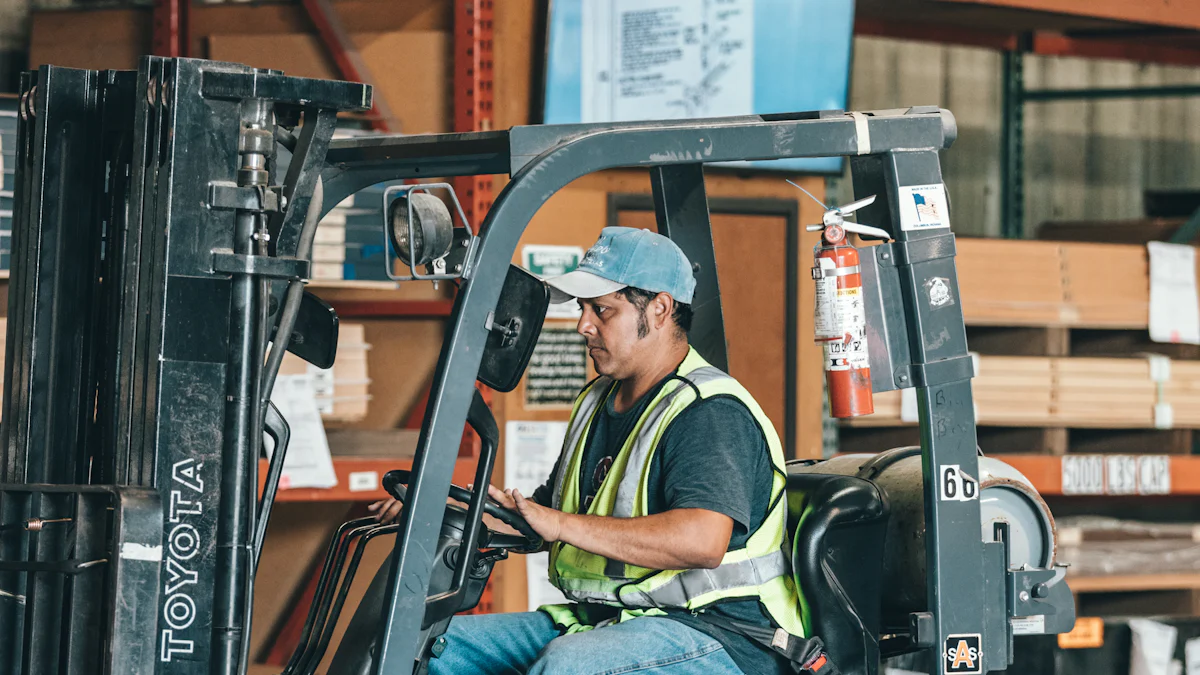
In the realm of warehouse operations, forklifts stand as indispensable workhorses, facilitating seamless material handling and logistical processes. As technology evolves and market demands shift, the landscape of forklift utilization undergoes significant transformations. This blog delves into the latest trends shaping warehouse small electric forklift and Pallet Jack usage in 2024, exploring innovations that redefine efficiency, sustainability, and safety within industrial settings.
Technological Advancements
Innovations in the realm of warehouse forklifts are revolutionizing industrial operations. Let’s delve into the cutting-edge advancements driving efficiency and productivity in 2024.
Automation and Robotics
Autonomous Forklifts
The evolution of forklift technology has led to the development of autonomous forklifts that redefine warehouse automation. These driverless machines navigate through facilities with precision, enhancing operational efficiency.
Integration with Warehouse Management Systems (WMS)
Warehouse Management Systems (WMS) integration optimizes forklift operations by streamlining inventory management and order fulfillment processes. This seamless connectivity enhances overall warehouse productivity.
Electric and Hybrid Forklifts
Benefits of Electric Forklifts
Electric forklifts are gaining prominence due to their eco-friendly nature and cost-effective operation. They offer reduced emissions, lower maintenance costs, and quieter performance, making them ideal for sustainable warehouses.
Hybrid Models and Their Advantages
Hybrid forklift models combine the best of electric and traditional power sources, offering versatility and efficiency. These innovative hybrid models provide enhanced power options while minimizing environmental impact.
IoT and Connectivity
Real-time Data Monitoring
Real-time data monitoring capabilities enable operators to track forklift performance metrics instantly. This data-driven approach enhances decision-making processes, leading to optimized workflow management.
Predictive Maintenance
Implementing predictive maintenance through IoT technologies ensures proactive equipment upkeep. By analyzing performance data in real time, potential issues can be identified early, preventing costly downtime.
Safety Innovations

Advanced Safety Features
Enhancing warehouse operations with cutting-edge technology involves the integration of advanced safety features. These features prioritize accident prevention and operational security, ensuring a secure working environment for all personnel.
Collision Avoidance Systems
Implementing collision avoidance systems on forklifts significantly reduces the risk of accidents in busy warehouse settings. By utilizing sensors and real-time data analysis, these systems enhance situational awareness and prevent collisions.
Operator Assistance Technologies
The introduction of operator assistance technologies complements human skills by providing additional support during complex maneuvers. These technologies offer real-time guidance and alerts, improving operator efficiency and reducing the likelihood of errors.
Ergonomic Designs
Fostering a safe and comfortable workspace is essential for optimizing productivity and minimizing workplace injuries. The integration of ergonomic designs in modern forklifts prioritizes operator well-being, leading to enhanced performance and job satisfaction.
Improved Operator Comfort
Improving operator comfort through ergonomic seat designs and adjustable controls minimizes physical strain during extended shifts. By prioritizing operator comfort, companies can boost morale and reduce the risk of musculoskeletal issues.
Reducing Fatigue and Injury
Efforts to reduce fatigue and injury focus on ergonomic innovations that promote proper posture and minimize repetitive stress. By incorporating features such as anti-vibration technology and intuitive controls, forklift operators can work efficiently while safeguarding their health.
Environmental Considerations
In the realm of warehouse forklifts, sustainability plays a pivotal role in shaping operational practices and manufacturing processes. Embracing eco-conscious initiatives not only benefits the environment but also enhances overall efficiency and cost-effectiveness.
Sustainable Materials and Manufacturing
- Use of Recycled Materials
- Incorporating recycled materials in forklift production reduces waste and minimizes the environmental impact of manufacturing processes. By utilizing sustainable resources, companies contribute to a greener future.
- Eco-friendly Manufacturing Processes
- Implementing eco-friendly manufacturing practices, such as energy-efficient technologies and waste reduction strategies, promotes environmental stewardship. By prioritizing sustainable methods, warehouses can reduce their carbon footprint while maintaining high-quality standards.
Energy Efficiency
- Battery Technology Improvements
- Advancements in battery technology have revolutionized the efficiency of electric forklifts. Enhanced battery life, rapid charging capabilities, and increased energy storage capacities contribute to prolonged operational uptime and reduced reliance on fossil fuels.
- Energy-saving Operational Practices
- Adopting energy-saving operational practices, such as optimizing route planning and implementing idle shutdown mechanisms, conserves power and reduces overall energy consumption. By promoting efficient usage patterns, warehouses can lower operating costs while promoting sustainability.
Market Trends and Predictions
Growing Demand for E-commerce
The surge in online shopping has fueled a growing demand for e-commerce across various industries, including automotive parts. This shift towards digital retail platforms has reshaped warehouse operations, emphasizing the need for efficient material handling solutions that cater to the demands of online consumers.
Impact on Warehouse Operations
The rise of e-commerce has redefined traditional warehouse dynamics, necessitating swift and accurate order fulfillment processes to meet customer expectations. Warehouses now face the challenge of managing diverse product ranges while ensuring timely deliveries in a competitive market landscape.
Forklift Adaptations for E-commerce
To align with the evolving demands of e-commerce, warehouses are adapting their forklift fleets to optimize efficiency and productivity. The integration of advanced technologies such as automation and real-time data monitoring enhances operational agility, enabling warehouses to streamline inventory management and expedite order processing.
Regional Market Differences
Diverse trends in North America, Europe, and Asia reflect unique market landscapes influenced by varying consumer behaviors and industrial practices. Understanding these regional nuances is crucial for adapting warehouse strategies to meet specific market demands effectively.
Trends in North America
In North America, the forklift market showcases a robust inclination towards technological advancements and sustainability initiatives. The region’s emphasis on innovation drives the adoption of eco-friendly electric forklifts and automation solutions, revolutionizing warehouse operations with enhanced efficiency and reduced environmental impact.
Trends in Europe and Asia
Conversely, Europe and Asia exhibit distinct trends shaped by cultural preferences and economic factors. European markets prioritize ergonomic designs and safety features in forklifts to ensure optimal working conditions for operators. In contrast, Asian markets focus on scalability and cost-efficiency, driving advancements in hybrid forklift models tailored to diverse operational needs.
Recap of the Key Trends Discussed:
- The integration of automation and semi-automation technologies is reshaping the forklift market, with a surge in demand for unmanned vehicles.
- Driverless forklifts are gaining momentum, driven by consumer awareness of health and wellness benefits.
Importance of Staying Updated:
- Keeping abreast of emerging trends ensures operational efficiency and competitiveness in the evolving warehouse landscape.
- Adapting to new technologies enhances safety measures and optimizes productivity.
Encouragement for Adoption:
- Embrace innovations in forklift technology to elevate efficiency, reduce costs, and enhance sustainability.
- Implementing driverless solutions can revolutionize warehouse operations, streamlining processes and boosting overall performance.
Call to Action:
- Stay informed about the latest advancements in warehouse forklifts to remain at the forefront of industry developments.
- Consider upgrading your fleet with cutting-edge technologies for improved efficiency and safety in 2024.
Post time: Jun-25-2024
